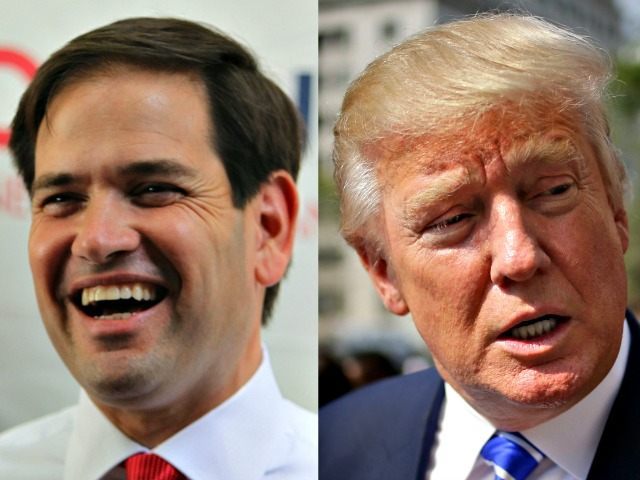A bevy of new polls were released Thursday and Friday, ahead of the final weekend before New Hampshire votes on Tuesday. The common denominator is that the race in New Hampshire is tightening. It isn’t really clear whether this is a normal tightening that happens ahead of actual voting or a real shift in momentum.
Suffolk University finds Marco Rubio surging in second place and Donald Trump’s lead in the state falling to just 10 points. John Kasich is third, Bush fourth, and Ted Cruz is fifth. Suffolk’s last poll, before the Iowa caucus, had Trump with a 15-point lead.
The ARG tracking poll, on the other hand, shows Trump leading the Republican field by 21 points, up 3 from the end of January. In this poll, Rubio, Cruz, and Kasich are tied for second.
WBUR shows Trump up 17. UMass-Lowell tracking poll pegs Trump’s lead at 19 points. In a CNN poll, though, Trump’s lead is down to 11 points, while NBC puts Trump’s lead at 13 points.
The margins of error in these polls range from 4 to 6 points, so, in reality, their estimates of Trump’s current lead aren’t that far off each other. The race for second and third place is very volatile, with just a few percentage points separating 4 or 5 candidates.
It was always unlikely Trump would win New Hampshire by 20 points, especially as the field has started to narrow. What isn’t clear, however, is if Trump’s lead is slipping enough to cause on upset in voting that is just a few days away.
Polling in primaries is always difficult, because voters are choosing between candidates when they may have genuinely divided feelings. Most of the candidates, being of the same party, will have at least some appeal to voters.
This difficulty is compounded in a state like New Hampshire, where voters have historically waited until the last possible moment to decide on a candidate. In 2008 and 2012, around 20 percent of voters made their final decision on election day itself.
In both elections, a total of around 40 percent of the electorate made their final decision in the days immediately preceding the election. That’s a window that starts today, Friday. A Republican debate on Saturday night is likely to have a big impact on these late-deciding voters.
In 2012, Mitt Romney was long the favorite to win New Hampshire, and he led polling in the state for the entire campaign. The final average of polls estimated his victory margin at 20 points. He ended up winning by 16 points. All the pollsters who are still polling the state in this election overstated Romney’s lead in the final days.
In 2008, most polls predicted a McCain win in the primary. The final average of polls put his winning margin at 3.6 points. He ended up winning by 5.5 points. Suffolk University, however, consistently put Romney in the lead in its poll. Its final poll predicted a Romney +4 win, a whopper that missed by 10 full points.
In the Democrat race in 2008, every final poll predicted an Obama victory. The final average of all the polls estimated Obama winning the state by 8.3 points. The actual outcome was a 2.6 point victory for Hillary Clinton. Keep in mind, this massive ten point difference was from the average of polls, not a single outlier.
The systemic failure of polling in the 2008 race recommends a fair amount of caution in the current election. Around half the final 16 polls in that race gave Obama double-digit leads over Hillary Clinton. All of these final polls were also conducted and released just days before the actual voting.
There is yet another unknown factor in trying to estimate the outcome of Tuesday’s race: weather. Heavy snow expected over the weekend in New Hampshire will scuttle several planned campaign events. It will also impact campaigns’ final get-out-the-vote efforts.
If inclimate weather persists, it could even affect overall turnout in the race. It should also be noted that some number of voters haven’t yet decided whether they will vote in the Democrat or Republican primary. New Hampshire allows voters to decide on a primary on the day of voting. With the Democrat race increasingly competitive, some unknown number of voters may choose to vote in that primary instead of the Republican.
In the end, we will know the results in New Hampshire soon enough. The polls in Iowa badly missed late surges by Hillary Clinton, as well as Ted Cruz and Marco Rubio. There is no reason to think the New Hampshire results won’t be equally volitile.

COMMENTS
Please let us know if you're having issues with commenting.